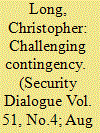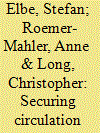| Srl | Item |
| 1 |
ID:
174715


|
|
|
|
|
| Summary/Abstract |
Understandings of the nature or inherent workings of molecular life in the field of biopolitical security studies have today been characterized predominantly in terms of contingency. This article challenges this characterization. It does so by identifying a particular logic of operation that organizes political action and intervention at both the level of the population and the molecular in response to the threats of smallpox, Ebola and pandemic influenza. It argues that, in fact, rather than securing by instantiating a general economy of the contingent, governing practices rely upon the characterization of the nature of molecular life in terms of its constant biological dynamics. Governments around the world, and the US government in particular, have reacted to the increased likelihood of the emergence of disease through the stockpiling of new pharmaceuticals, including the antivirals ST-246, ZMapp and Tamiflu. Antivirals represent a pharmaceutical tool stockpiled by governments to ensure that they can respond to the emergence of novel biological threats. The characterization of the nature of molecular life in terms of its constant biological dynamics is so important, then, as it is this that underpins political programmes of preparedness that utilize antivirals in the prevention of disease.
|
|
|
|
|
|
|
|
|
|
|
|
|
|
|
|
| 2 |
ID:
134474


|
|
|
|
|
| Summary/Abstract |
Governments in Europe and around the world amassed vast pharmaceutical stockpiles in anticipation of a potentially catastrophic influenza pandemic. Yet the comparatively ‘mild’ course of the 2009 H1N1 pandemic provoked considerable public controversy around those stockpiles, leading to questions about their cost–benefit profile and the commercial interests allegedly shaping their creation, as well as around their scientific evidence base. So, how did governments come to view pharmaceutical stockpiling as such an indispensable element of pandemic preparedness planning? What are the underlying security rationalities that rapidly rendered antivirals such a desirable option for government planners? Drawing upon an in-depth reading of Foucault’s notion of a ‘crisis of circulation’, this article argues that the rise of pharmaceutical stockpiling across Europe is integral to a governmental rationality of political rule that continuously seeks to anticipate myriad circulatory threats to the welfare of populations – including to their overall levels of health. Novel antiviral medications such as Tamiflu are such an attractive policy option because they could enable governments to rapidly modulate dangerous levels of (viral) circulation during a pandemic, albeit without disrupting all the other circulatory systems crucial for maintaining population welfare. Antiviral stockpiles, in other words, promise nothing less than a pharmaceutical securing of circulation itself.
|
|
|
|
|
|
|
|
|
|
|
|
|
|
|
|